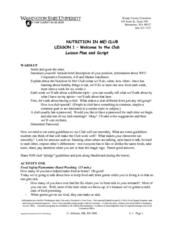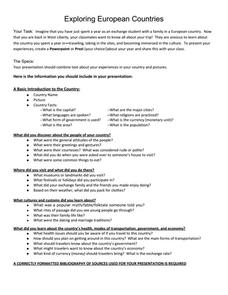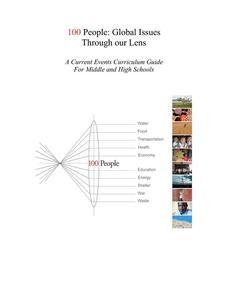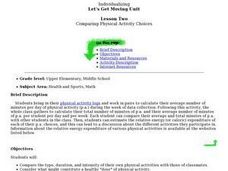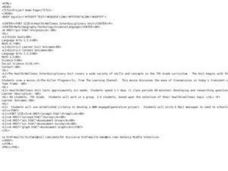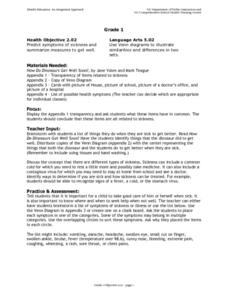Curated OER
Healthy Eating
A highly informative presentation focuses on healthy diets, food facts, the food pyramid, and healthy eating myths. There is a lot of great information in this PowerPoint, and a really fun interactive component. Perfect for your upper...
Curated OER
Healthy Teeth
A simple, yet effective lesson on dental health is here for your young learners. In groups, your class will place eggs in cups that contain a variety of liquids and observe what happens to the color of the egg. They brush the egg with a...
Curated OER
Nutrition In Me! Club
Students practice food safety and hand washing. In this health lesson, students discuss the presence of germs and how to keep yourself safe. Students wash their hands after applying Glo-Germ to see what spots they missed.
American Heart Association
Meet the Calorie
What is a calorie and how does it work? How many calories do we consume in a typical day, and how many do our cells need to function well? Your learners will answer these questions and more using a worksheet, which includes...
Plum Tree
Progressive Muscle Relaxation
Relax! How many times have you heard that command but did not know how to proceed? Well, the, check out this resource that gives step-by-step directions for a relaxation process.
Curated OER
Arctica - An Interactive Mystery
Rumours of illness, poisoning, and madness - a ship disappears without a trace! Read this interactive science story and use deductive reasoning skills to solve a mystery. This engaging resource gives science stars a chance to practice...
Curated OER
Skin Cancer Lesson Plan
Skin care is a topic often overlooked in the health curriculum. This should not be the case because most types of skin cancer can be prevented, or if detected early enough, can be successfully treated. So take the time to teach your...
Curated OER
Aerobic/Anaerobic Respiration
Both aerobic and anerobic respiration are introduced in this succinct PowerPoint. The chemical equations for both are included. The last slides give instructions for a lab activity in which pupils use a gas sensor to measure the...
Curated OER
Food and Energy
How many calories are needed each day? What foods have good calories? What happens to calories that don't get used? How many calories are in the different kinds of foods and drinks? How many calories do I need to do a certain activity?...
Curated OER
Is It Ethical to Eat Meat?
Have your class join a blog about whether or not eating meat is good for you. They'll read several passages regarding meat processing and consumption, then they post what they think. There are six critical-thinking prompts to help them...
US National Library of Medicine
Drug Use and Abuse: Past and Present
Pick your poison: tobacco, alcohol, opiates, cocaine, or marijuana. An online exhibition launches a research project that asks groups to select one of the five drugs and gather information on how the use of the drug and the regulations...
Curated OER
Hand Washing
Mostly discussion, this lesson explores the importance and methods of hand washing. A few true stories of community illnesses spread by the neglect of washing hands serve as an anticipatory set. The activity is most memorable if you are...
Generation Rx
My Generation Rx: Lead the Scene
Prescription drugs may start out with legitimate usage, but lately they are finding their way to high school and college party life. Have a discussion with the teenagers in your class on prescription drug abuse with a PowerPoint...
Curated OER
Human Body Series - Cardiovascular System
Pump up your class while studying the cardiovascular system with this pair of activities. In one, learners record heart rates during different actions. In the second, they read kid-friendly heart health articles online and then write a...
American Physiological Society
Drug the Water Flea
This is a flea. This is a flea on drugs. Any questions? Your class will have questions aplenty during an impactful experiment. Lab groups get to know Daphnia magna, the humble water flea, and study the effects of stimulants and...
West Liberty Community School District
Exploring European Countries
Your class members will each explore a European country of their choice and report back to the class using a creative PowerPoint or Prezi. They will not only include a basic introduction to the country, but also what they discovered...
Baylor College
Observing Different Microbes
Following directions from a colorful slide preparation card, beginning biologists examine three different live microorganisms: bacteria, yeast, and paramecia. This is not an unusual activity to do with your class, but if you are doing it...
Baylor College
What Is a Neuron?
Your class won't get on your nerves while doing this modeling activity! After teaching the structure and function of a neuron using the included diagrams, give individuals some clay and chenille stems so that they can make their own...
Baylor College
Pre-Assessment: The Brain
Break your class in to the general structure and function of the brain. Brainiacs discuss what they know about it and create personalized brain development timelines. They also take a true-false, pre-assessment quiz to get them thinking...
100 People Foundation
100 People: Global Issues Through Our Lens
If the world were 100 people...17 would not have access to safe drinking water, 18 would not be able to read or write, and 52 would not have a primary education. Using the theme of "100 people," this resource explores other major issues...
Curated OER
Comparing Physical Activity Choices
A physical activity log will help your elementary students keep track of their activities. Your class will calculate the average number of physicaly active minutes per day. They compare with other students and then estimate the relative...
Curated OER
Health/Wellness Interdisciplinary Unit
Students examine human body systems, research a disease or condition, analyze their family trees to look for health conditions and/or diseases which may be prevalent, discover ratio and proportions of human body, and read novel, The...
Curated OER
Health Styles
Students define and compare health terms. They estimate a person's health status on each dimension of health. They describe the major determinants of health.
Curated OER
When You're Sick
Second graders identify symptoms of illness and how they can get better. In this health instructional activity, 2nd graders use Venn diagrams to categorize what the character of a story did to get well, and different types of symptoms.




